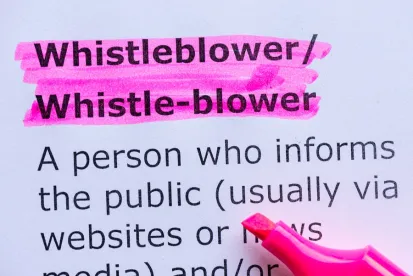The Ninth Circuit unanimously concluded that a trustee and lawyer for certain multiemployer funds violated ERISA § 510 by unlawfully firing a whistleblower in the funds’ collections department, but, in a split decision, concluded that the retaliation did not amount to a breach of fiduciary duty. The whistleblower was cooperating with a DOL criminal investigation of one of the trustees and had raised concerns to another trustee and the funds’ third-party administrator that the trustee under investigation was actively hindering the funds’ efforts to collect contributions from certain contributing employers. After the trustee and the funds’ counsel, who were carrying on a romantic relationship, caught wind of the investigation, they set in motion votes by the full board of trustees to place the whistleblower on administrative leave and ultimately to terminate her employment. The Secretary of Labor filed a civil enforcement action against the trustee and the funds’ counsel, alleging that they engaged in unlawful retaliation under ERISA § 510 and a breach of fiduciary duty under ERISA § 404. The Secretary settled similar claims against the full board of trustees and other third-parties. Following a bench trial, the district court entered judgment in favor of the Secretary and against the trustee and funds’ counsel on both claims.
The Ninth Circuit unanimously affirmed the district court’s ruling that the trustee and counsel engaged in unlawful retaliation in violation of Section 510. The Court held that the whistleblower’s cooperation with the DOL was quintessential protected activity, and that defendants were liable because they arranged the vote by the full board of trustees that resulted in the whistleblower’s termination, they influenced the vote by recommending the whistleblower’s termination, and the trustee had the authority to remove other union trustees or have their positions with the union terminated.
However, the Ninth Circuit, in a split decision, reversed the district court’s ruling that the retaliation against the whistleblower constituted a breach of fiduciary duty. In so ruling, the Court concluded that the district court failed to address the threshold question of whether the union trustee was acting in a fiduciary capacity when he engaged in the challenged conduct, i.e., placing the whistleblower on leave or terminating her employment. The dissenting judge opined that the trustee’s effort to terminate the whistleblower was a fiduciary act because it was “inextricably intertwined” with management and administration of the funds, it was designed to shield the trustee’s role in the funds’ mismanagement from additional scrutiny, and a contrary result would subvert ERISA’s goal to safeguard plan assets.



 />i
/>i

